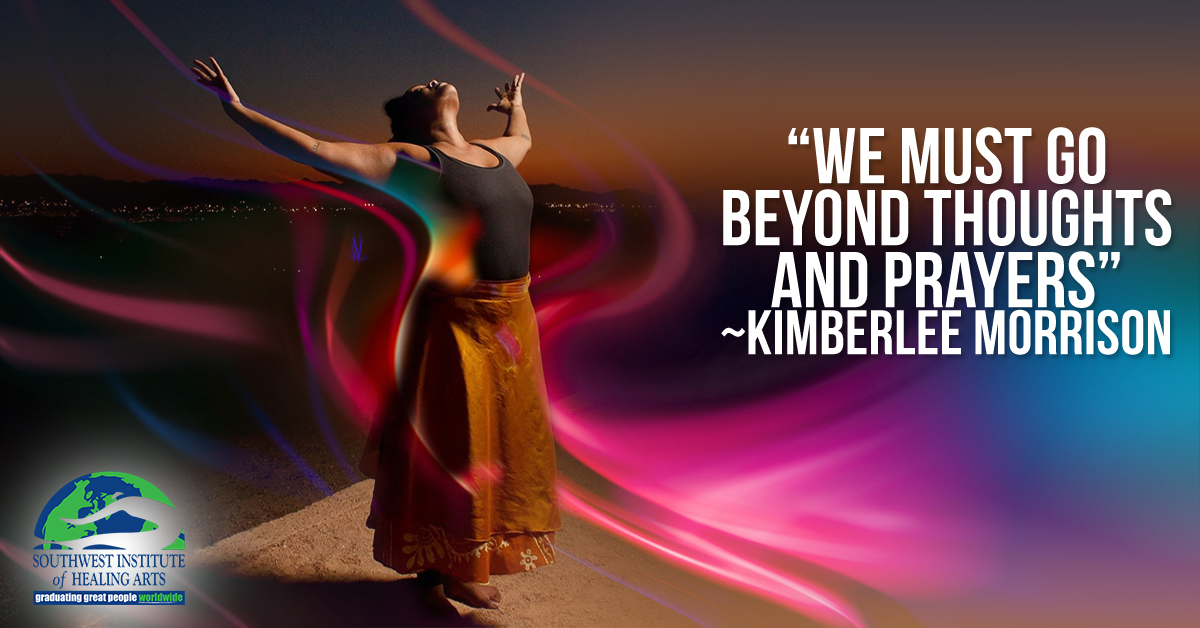
Yoga means union: The union of oneself and the divine source; the union of mind, body and spirit; the union of your internal Self with the self that manifests in the world. Yoga is not intended to be a passive practice of self-mastery, it’s a system for living that provides us with an ethical framework — the Yamas and Niyamas — for how we should treat ourselves, and how we should treat others.
The first pillar in this framework is Ahimsa (nonviolence or non-harming) which is often used to justify veganism as the standard diet for yogis. Stopping here makes ahimsa a one-dimensional practice focused on reducing violence against some beings (animals), while failing to look at the broader picture of reducing our harmful impact within society.
In the context of social justice, ahimsa is an invitation to examine the systems of capitalism, patriarchy, and white supremacy and how they cause harm, not just to animals, but to all living beings. While the Yoga Sutras say that we must cultivate nonviolent thoughts and emotions, we must go beyond thoughts and prayers, and take action to reduce harm and dismantle the violent systems that make it impossible for all beings to live free of suffering.
Ahimsa =/= Peace
Outside of justifying veganism and encouraging self-love, ahimsa is often used interchangeably with the idea of peace. People often point to Gandhi and Martin Luther King as men of peace, which only serves to water down the legacy of two men who demanded peace, but did so through disruption. And disruption is the opposite of peace.
Both Gandhi and MLK were nonviolent revolutionaries who turned ahimsa into action against oppressive systems. Gandhi led the Indian independence movement against the British empire, and Martin Luther King led the desegregation movement in the American South. While both men espoused the philosophy of nonviolence, they also actively resisted the oppressive systems of colonialism and white supremacy through civil disobedience. They also knew that they had to be disruptive in their action to affect change.
“We adopt the means of nonviolence because our end is a community at peace with itself. We will try to persuade with our words, but if our words fail, we will try to persuade with our acts.” ~ Martin Luther King.
Ahimsa in Action
It’s not enough to respect the labor of the bees or the lives of the cows and call it ahimsa. How can ahimsa be complete when we consider the harm and exploitation of livestock, but not the humanity of the migrant workers who harvest the fruits and vegetables for plant-based diets? If we are serious about living our Yoga, we must also be serious about standing against violence in all of its forms, including human oppression, environmental devastation, and everything in between.
In his book Stride Toward Freedom, Martin Luther King outlined six principles of nonviolence to help us put ahimsa into action; these principles are emblazoned at the entrance to the King Center for Nonviolent Social Change:
-
Nonviolence is a way of life for courageous people. It is active nonviolence against evil.
-
Nonviolence seeks to win friendship and understanding. The end result of nonviolence is redemption and reconciliation.
-
Nonviolence seeks to defeat injustice, not people. Nonviolence recognizes that evildoers are also victims.
-
Nonviolence holds that suffering can educate and transform. Nonviolence willingly accepts the consequences to its acts.
-
Nonviolence chooses love instead of hate. Nonviolence resists violence to the spirit as well as the body. Nonviolence love is active, not passive. Nonviolence love does not sink to the level of the hater. Love restores community and resists injustice. Nonviolence recognizes the fact that all life is interrelated.
-
Nonviolence believes that the universe is on the side of justice. The nonviolent resister has deep faith that justice will eventually win.
Are you ready to show up in the courageous spirit of ahimsa and active nonviolence? Together we can stand in love and create a just and equitable world where all beings can live happy and free.


